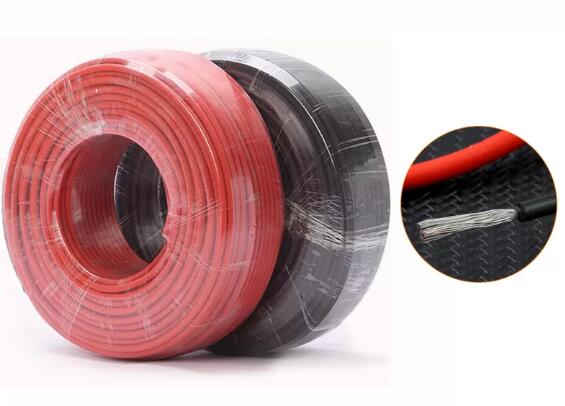- Home
- Products
- Certificates
- Cooperation
- About Us
- News
- Contact
Contact
Contact
Mar. 05, 2025
As the solar energy industry continues to expand, the demand for efficient and cost-effective solar cables is rising. Among various types, PVC solar cables have gained popularity due to their affordability, durability, and ease of installation. In this article, we will explore the construction, advantages, and applications of PVC solar cables from a manufacturer’s perspective, providing valuable insights for procurement professionals seeking reliable solutions.

PVC solar cables are photovoltaic (PV) cables insulated and sheathed with polyvinyl chloride (PVC) material. These cables are designed to transport DC electricity from solar panels to inverters or battery storage systems.
Unlike XLPE solar cables and halogen-free solar cables, which are often used in harsh environments, PVC solar cables provide a cost-effective alternative for less demanding applications. They are widely used in residential solar installations, commercial PV systems, and off-grid solar projects where environmental exposure is moderate.
Manufacturers design PVC solar cables to meet industry safety and performance standards. A typical PVC solar cable consists of:
1. Conductor Material
Copper (Tinned or Bare): Ensures high electrical conductivity and low resistance.
Aluminum: A more affordable but less conductive alternative.
2. Insulation Layer (PVC)
Acts as a protective barrier against moisture, UV radiation, and chemical exposure.
Provides good mechanical strength and flexibility for easy installation.
3. Outer Sheath (PVC)
Enhances durability and flame resistance.
Offers moderate weather resistance, making it suitable for indoor and sheltered outdoor applications.
PVC solar cables offer a balance between performance and affordability, making them an attractive choice for solar system installers and procurement managers. Some of the key benefits include:
1. Cost-Effective Solution
Compared to XLPE solar cables or rubber-insulated PV cables, PVC solar cables are cheaper to manufacture and purchase, reducing overall solar project costs.
2. Ease of Installation
Lightweight and flexible, making it easier to handle and install.
Available in various sizes (e.g., 4mm², 6mm², 10mm²) to match different PV system requirements.
3. Flame Retardant Properties
PVC insulation complies with fire safety standards such as IEC 60332-1.
Reduces fire hazards in residential and commercial installations.
4. Good Electrical Performance
Offers low power loss and stable conductivity over time.
Supports voltage ratings of 600V to 1000V, suitable for small to medium-sized solar installations.
5. Resistance to UV and Chemicals
Treated PVC solar cables provide UV-resistant properties for extended outdoor use.
High resistance to oils, acids, and alkalis, ensuring longer service life in different environments.
Procurement managers and installers use PVC solar cables in various solar energy projects, including:
Residential Solar Systems: Ideal for rooftop PV installations with moderate exposure to sunlight.
Commercial Solar Projects: Used in offices, warehouses, and shopping centers where cables are mostly routed indoors.
Off-Grid Solar Systems: Suitable for solar farms, rural electrification, and backup power solutions in protected environments.
Hybrid Solar Installations: Often integrated with solar batteries and grid-tied systems for efficient power distribution.
To ensure reliability and safety, manufacturers produce PVC solar cables in compliance with international regulations, such as:
IEC 60227 – Standard for PVC-insulated cables.
IEC 60332-1 – Flame retardant cable classification.
TÜV Rheinland Certification – Guarantees quality and safety in the EU market.
RoHS Compliance – Ensures cables are free from hazardous substances.
When sourcing PVC solar cables, procurement professionals should consider the following factors:
Manufacturing Standards: Look for a supplier that meets IEC, UL, and TÜV certifications.
Material Quality: Ensure the use of high-grade copper or aluminum conductors with durable PVC insulation.
Customization Options: Choose manufacturers offering customized cable sizes and specifications.
Industry Reputation: Partner with trusted suppliers that provide reliable customer support and bulk order capabilities.
Warranty and Longevity: Verify warranty policies to ensure long-term performance.
PVC solar cables play a vital role in solar energy systems by providing an affordable, durable, and easy-to-install wiring solution. While they may not offer the extreme durability of XLPE or halogen-free solar cables, they remain a cost-effective choice for residential and commercial solar projects with moderate environmental exposure.
By understanding the construction, advantages, and industry standards of PVC solar cables, procurement professionals can make informed purchasing decisions to enhance their solar installations. If you are looking for a reliable PVC solar cable manufacturer, ensure they meet industry certifications, offer high-quality materials, and provide scalable solutions to support your project needs.
For inquiries about bulk PVC solar cable orders, customization, or pricing, feel free to contact our expert team today!